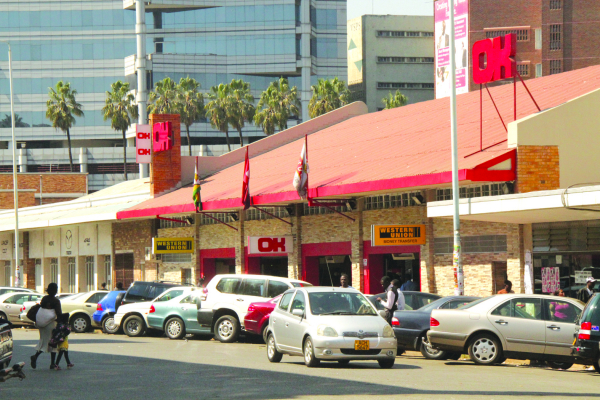By ETimes

Financial Performance Highlights
- Listed supermarket group OKZim Limited reported a ZWL$3.96 billion inflation adjusted after tax profit for its half-year ended 30 September 2022 – a 193% rise from the 2021 comparative.
- Gross profits declined by 24% to ZWL$11.5 billion, with the group reporting pricing challenges in the inflationary environment, as well as stricter trading terms from suppliers – prepayments to suppliers rose by 127% to ZWL$6.4 billion while the gross profit margin fell from 16% to 9%.
- The group made an operating loss of ZWL$7.6 billion, which was overcome by net monetary gains of ZWL$20.8 billion.
- Revenues climbed by 35% to ZWL$129 billion despite facing an 8.23% decline in volumes which was attributed to depressed consumer spending power.
- The group’s operations generated a net cash flow of ZWL$2.7 billion, up 454% from the 2021 comparative. Net investment expenditures declined by 57% to ZWL$2.9 billion. The funds were primarily used in the group’s branch refurbishment programme which is expected to continue into the second half-year.
- Total assets stood at ZWL$100.9 billion, with cash holdings of ZWL$3.1 billion, receivables of ZWL$1.8 billion and inventories of ZWL$27.8 billion. Total liabilities stood at ZWL$51.3 billion and total borrowings were at ZWL$6.1 billion – up 33% from the comparative figure.
- According to the group, borrowings were increased to fund its short to medium term strategic plan. In the period following the reporting date, the group reached an agreement and gained regulatory approval to acquire the Food Lovers Market supermarket chain. The deal sees OKZim assume control of Food Lover Market’s Borrowdale, Avondale and Bulawayo outlets. The group also attains a Territorial Rights Licence which it will use to expand Food Lovers’ domestic footprint. The group also registered a new instore pharmaceutical business – Alowell Pharmacies, which it expects to roll out during the festive period. Further details of the transaction and new business line will be released to the public in due course.
- In the boardroom, Mr. W.S. Nyabereka joins the board of directors with effect from 1 June 2022.
- A dividend of USc0.13 was declared for the period, payable on or around the 20th of January 2023 to shareholders registered on 6th of January 2023.
- Looking ahead, the group expects exchange and inflation factors to continue to depress consumer demand, but expressed confidence in its initiatives to increase volumes. The group noted the adverse impact of the ongoing power supply challenges on its operating costs, and encouraged the government to provide relief through diesel price adjustments and, initiatives to encourage investment in the renewable energy sector. The group also encouraged the government to review its IMT Tax policy, noting its adverse impact on business costs after incurring charges of ZWL$1.5 billion during the period.
Commentary and Analysis
The results suggest OKZim is getting squeezed by its ZWL invoicing local suppliers, as implied by the sharp decline in the gross profit margin. It is an uneasy situation given the near impossible likelihood that the group can pay all of its local suppliers on US dollar terms. The general consensus is that the current high borrowing costs are transitional, and will be suitably revised at an appropriate time. In that sense, the declined profitability could just be a short-term speed bump for the group, not requiring any major short-term address – stability in the operating expense to revenues ratio suggests the group’s cost management was relatively effective. It likely means the group has to concentrate its internally generated cash flows towards working capital management – which corresponds with the additional debt raised to support the group’s planned capital projects. It is worth noting that procurement practices in the supermarket industry have occasionally drawn criticism from suppliers. With the informal markets providing increasingly viable distribution channels, the current shift in the dynamic could have some long-term effects.

The acquisition of the the Food Lovers Market stores is the big story coming out of the results. Up to 2019, the group’s revenue growth was fairly flat before making a sharp rise in 2020, but has been on a decline in the proceeding financial years (see Graph 1). The group’s operating profit margin performance has been fairly inconsistent in the de-dollarized era, but generally fluctuated around 3% under less volatile economic conditions (See Graph 1). Growth in the group’s storefront footprint has not shown strong correlation with growth in revenues (See Graph 2). These factors arguably go some way towards explaining the groups move to acquire Food Lovers Markets and expand its service portfolio to pharmaceutical retail. Food Lovers presents an opportunity for OKZim to diversify its business into the high-end segment of the food retail market. Admittedly, Food Lovers has comparatively small footprint with a heavy geographic concentration on Harare – but the idea seems to be to expand the footprint across the country. So it reads like a long-term play, with the current economic context likely to limit the viability of some of the untapped markets. Nevertheless, a future with rising demand for high-end food products is foreseeable and the Food Lovers brand is arguably the most recognizable within that niche market. With the financial backing of OKZim, as well as the groups supplier networks and logistics infrastructure its a move that should theoretically work out. The concern will be how effectively the group can align the unique demands of the new business segment with it’s own established organizational philosophies and practices. Interestingly, Mr. P. Karombo – the group’s recently appointed CEO is touted as a business strategist. 
On the ZSE, since the start of 2022, the OKZim share gained 25% in nominal terms and 80% in implied US dollar terms. The share has a 12 month high of ZWLc6,216.36 and a low of ZWLc2,040.56. It is currently trading at a price to book ratio of 0.9x – Harare




